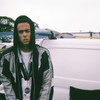Via Discogs.
As a part of a bygone, and often neglected, corner of British rave culture, the news of Colin Faver's passing will probably have inspired two varying responses across the UK this weekend. For younger generations listening to club music, his name might not mean anything beyond a vague connection to Kiss FM — however for many in the generations before them, Colin Faver was responsible for everything.At this stage, very little is known about his death, yet was it palpable already is the magnitude of sadness felt by so many. In order to get a feel for how real and felt his impact was, we got in touch with MC Rage, best known as part of the live Chase and Status experience, but more importantly a fixture and devotee of London rave culture for as long as he can remember. His memories of Colin Faver are as powerful testimony as any, as to his game-changing contribution."My mum worked in a children's home during the night, so I used to sneak out to Rage on a Thursday night and then get the night bus home before she finished work. That was my favourite club night, it's where I got my MC name, and it was my favourite place to hear Colin Faver. I knew his name before I'd ever heard him play a record. My older brother, and cousins, all used to go to Camden Palace where he was a resident so that's how I first came to hear about him — they'd tell me he was their favourite DJ, or I'd read his name on the flyers.""The way we listened to music back then was different. It wasn't separated into house or techno, it was just rave music. Colin's early mixes represented that best, that acid rave sound that became the quintessential soundtrack to our weekend. Funny thing was, we were too young to go raving when we first started listening to it, but my brother used to record his Kiss FM show religiously so me and my friends would sit in our bedrooms listening to those tapes and imagine raving. We'd pretend to be in the club, pretend to be DJs. That generation, we'd just left school, we didn't know the names of artists or labels or tracks, we just had these tapes full of these mixes, and the voice of Colin Faver, who had this very calming manner, guiding us through it.""It's sad in a way, I've become so immersed in new music and always looking for the latest thing, that it took hearing about Colin's death to get me to go back to those three hour mixes. As soon as I started listening to them, I was thrown back to everything about those days. What we wore, how we talked, the DJ magazines we used to read — flicking through looking for pictures of DJs, or inside the Hacienda.""He played all sounds, it was this 360 degree circle of rave. He dug so deep, deeper than any DJ now goes. I suppose now anybody can be a DJ, but he was the first to push this idea of selection. Capturing those unbelievably obscure cuts way before anyone else. I was talking to friends about this when we heard he'd died, and it's amazing, there really was nobody before him. It was him, Dave Pearce playing hip-hop on GLR, and David Rodigan also on Kiss. True pioneers. In that respect what Rodigan did for reggae, Faver did for the rave.""You can map it. There's the generation coming up now, then before them Chase and Status, Skream and Benga. Then before them Fabio and Grooverider, then before them Massive Attack — then Faver. He started spinning punk, or soul, then clocked this acid rave sound and went on to influence an entire generation of people who wanted to throw parties."Speaking to Rage in many ways is more powerful than listing Faver's various accomplishments. Obviously, having played a founding role in Kiss FM, held residencies at Camden Palace, and regular spots at Shoom and Rage, his place in the history of British rave culture is already apparent. Yet the real legacy here, were the three hour mixes recorded religiously onto tape, inspiring a generation of school leavers to sit in their bedrooms pretending to DJ to themselves in the mirror, eventually leading them to sneak into clubs and continue to build the culture themselves.
Advertisement
Advertisement
